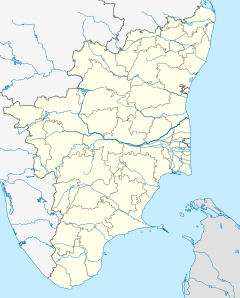| Ramanathaswamy Temple | |
|---|---|
Arulmigu Sri Ramanathaswamy Tirukkoyil | |
 | |
| Religion | |
| Affiliation | Hinduism |
| District | Ramanathapuram |
| Deity | Ramanathaswamy (Shiva) Parvatavardhini (Parvati) |
| Location | |
| Location | Rameswaram |
| State | Tamil Nadu |
| Country | |
| Geographic coordinates | 9°17′17″N 79°19′02″E / 9.288106°N 79.317282°E |
| Architecture | |
| Type | Tamil architecture |
| Creator | Pandya and Jaffna kings |
| Website | |
| https://rameswaramramanathar.hrce.tn.gov.in/hrcehome/index_temple.php?tid=35671 | |
The Ramanathaswamy Temple (Rāmanātasvāmi Kōyil) is a Hindu temple dedicated to the Hindu god Shiva located on Rameswaram island in the state of Tamil Nadu, India. It is one of the twelve Jyotirlinga temples. It is one of the 275 Paadal Petra Sthalams, the sacred sites glorified by the Nayanars (Shaivite poet-saints), Appar, Sundarar, and Sambandar, with their songs. According to tradition, the lingam (an aniconic form of Shiva) of the Ramanathaswamy Temple was established and worshipped by Lord Ram before he crossed the bridge called Rama Setu to the island kingdom of Lanka, identified with Sri Lanka. It is one of the Char Dham pilgrimage sites. The temple was expanded during the 12th century by the Pandya Dynasty, and its principal shrine’s sanctum was renovated by Jeyaveera Cinkaiariyan and his successor Gunaveera Cinkaiariyan, monarchs of the Jaffna kingdom. The temple has the longest corridor among all the Hindu temples of India. It was built by King Muthuramalinga Sethupathy.[1][2] The temple is considered a pilgrimage site for Shaivites, Vaishnavites, and Smartas.
- ^ "King 'Rebel' remembered". The Hindu. 31 March 2016.
- ^ Cite error: The named reference
Meenawas invoked but never defined (see the help page).




